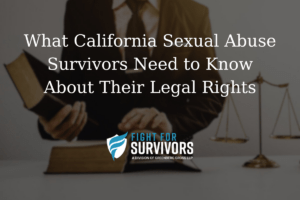
Survivors of sexual abuse in California have legal options to seek justice, hold perpetrators accountable, and obtain compensation for the harm they have suffered. Whether the abuse occurred in childhood or adulthood, understanding your rights under California law is essential.
Recent legal reforms, including the California Child Victims Act, have expanded the rights of sexual abuse survivors, allowing more time to file civil lawsuits and pursue criminal charges. This guide explains the legal process, the statute of limitations, and the steps survivors can take to seek justice.

Legal Options for Sexual Abuse Survivors
Survivors of sexual assault in California can take both civil and criminal legal action against perpetrators and institutions that allowed the abuse to occur.
- Criminal cases involve law enforcement and prosecutors pursuing criminal charges against the perpetrator. A conviction can result in severe consequences, including prison time and sex offender registration.
- Civil cases allow survivors to file civil lawsuits to seek financial compensation for medical expenses, emotional distress, lost wages, and other damages. Civil claims can be pursued even if criminal prosecution is not possible.
The California Child Victims Act and the Statute of Limitations
One of the most significant legal changes in recent years is the California Child Victims Act, which extends the statute of limitations for childhood sexual abuse survivors to file civil lawsuits.
- Survivors of childhood sexual assault can file a civil lawsuit until the age of 40 or within five years of discovering the connection between their abuse and its effects.
- A three-year “lookback window” allowed survivors of childhood sexual abuse to file lawsuits even if the previous deadline had passed. This window closed in 2022, but many survivors were able to seek justice.
- The statute of limitations for adult survivors of sexual assault has also been extended, allowing them to file civil lawsuits within 10 years of the assault or three years from discovering emotional distress caused by the abuse.
Understanding these legal timeframes is critical for survivors who want to take legal action before their opportunity expires.
Pursuing Criminal Charges for Sexual Assault
Contact Us For A Free Legal Consultation. No Fee.
Call (833) 55-FIGHTSurvivors can report abuse to law enforcement to initiate a criminal investigation. In California, there is no statute of limitations for certain sex crimes, meaning that some sexual assault cases can be prosecuted no matter how long ago the assault occurred.
Law enforcement will gather evidence, including DNA evidence and witness statements, to build a case against the perpetrator. If sufficient evidence exists, prosecutors may pursue criminal charges, which can lead to a criminal conviction.
Filing Civil Lawsuits for Sexual Abuse
Filing a civil lawsuit allows survivors to seek compensation for the harm they have suffered. Civil claims can be filed against individuals, organizations, school districts, religious institutions, and other entities that allowed the abuse to happen.
Compensation in civil lawsuits may cover:
- Medical expenses, including medical bills for treatment related to the abuse
- Lost wages for time missed at work due to the trauma
- Emotional distress caused by the abuse and its long-term effects
- Other financial compensation for damages suffered
Survivors can also seek compensation from institutions that failed to protect them, helping to prevent future abuse by holding organizations accountable.

Emotional Support and Additional Resources
Taking legal action can be emotionally challenging, but survivors do not have to go through the process alone. Social workers, legal advocates, and trauma-informed professionals can provide emotional support throughout legal proceedings.
If you are a survivor of sexual abuse, you have the right to seek justice, financial compensation, and legal remedies under California law. Speaking with an experienced law firm can help you understand your options and take the next steps toward healing and accountability.
Frequently Asked Questions
Can I still file a lawsuit if the abuse happened years ago?
Yes. California has extended the statute of limitations for childhood sexual abuse and adult sexual assault cases, giving survivors more time to file civil lawsuits.
What if my case doesn’t qualify for criminal prosecution?
Even if criminal prosecution is not possible, survivors can still pursue civil claims to seek financial compensation for damages.
How can I prove my case in a civil lawsuit?
Evidence such as witness statements, medical records, DNA evidence, and psychological evaluations can help support your claim.
Do I need a lawyer to file a civil lawsuit?
Yes, working with a knowledgeable law firm can help you navigate the legal process and ensure your rights are protected.
What should I do if I want to take legal action?
You can contact a law firm for a confidential consultation to discuss your case and determine the best course of action.
Experienced Attorneys Who Will Listen And Fight For You
Speak To An Attorney Now »